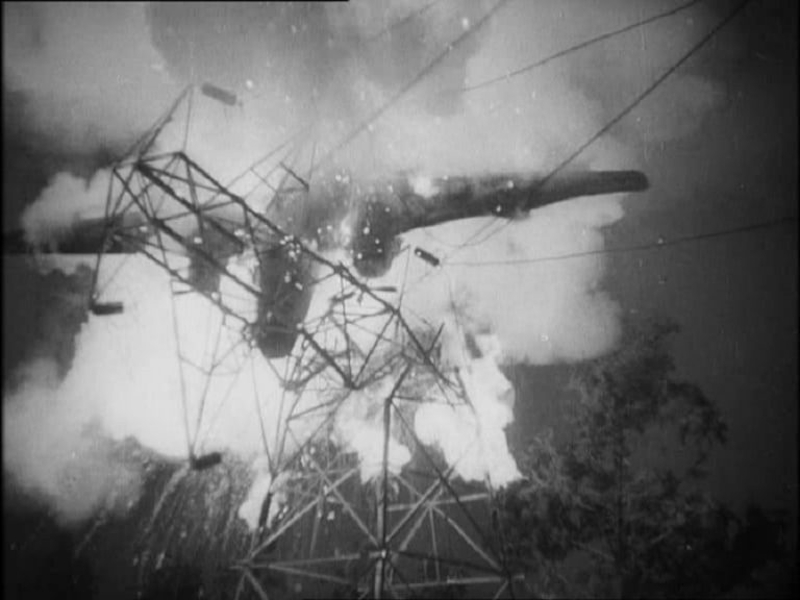Producers-Writers-Directors – The Archers (Michael Powell and Emeric Pressburger) – 1942 – UK – Cert. PG – 103m
*****
Forced to bail out following an otherwise successful mission in which one engine is disabled, a British bomber crew must find their way across occupied Holland to return to the safety of Britain – part of major season Cinema Unbound: The Creative Worlds Of Powell + Pressburger from Monday, October 16th at BFI Southbank, also on BFI Blu-ray; other films in the season can be found on BFI Player
Made at the height of World War II, the first Powell and Pressburger / The Archers movie to deploy that verbal credit as such – but without their later trademark opening shot of an arrow striking its target – is in essence a propaganda exercise in the guise of a narrative feature film made to bolster wartime morale at home. However, the pair pull the whole thing off with such verve and inventiveness that it feels less an exercise in propaganda and more a rattling good yarn (without compromising either way).
It opens like a bizarre ghost story (as bizarre as the curse upon the Lairds of Kiloran in the castle ruins of “i know where I’m going!”, Powell and Pressburger, 1945) with bombers bar one, code name B for Bertie, returning from a sortie. There is no contact with the crew – prefiguring, perhaps, the doomed airman talking to a radio operator as it goes down at the start of A Matter Of Life And Death (Powell and Pressburger, 1946) and the bomber – empty of crew – makes it back to the British mainland only to crash into a pylon.
There follows in flashback a brief title sequence introducing the six members of the crew by voice with each actor’s name on the screen as their character appears: the pilot (Hugh Burden), Tom Earnshaw, 2nd pilot (Eric Portman), Frank Sherry, observer (Hugh Williams), Bob Ashley, wireless op. (Emrys Jones), Geoff Pickman, front gunner, all correct (Bernard Miles), George Corbett, rear gunner (Godfrey Tearle), plus titles against the shadow of a windmill detailing the six actors playing characters on the ground in Holland.
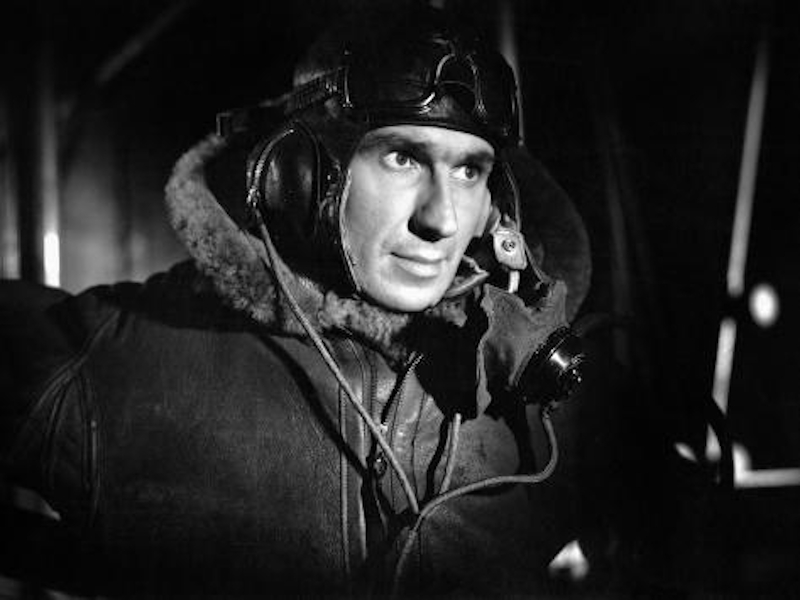
Just as early on a sequence of the empty flying bomber interior was featured, once it’s seen fully crewed in flashback we get a real feel for the six-man team, a picture of get the job done efficiency with synchronised watches, incidents recorded in logbooks and the dropping of leaflets on the enemy before the releasing of bombs. Crossing the Dutch coast, they talk about girls from Stuttgart (the town which is that night’s target) and there’s the bizarre feeling that “the enemy” are people like us… and yet, they’re now the enemy.
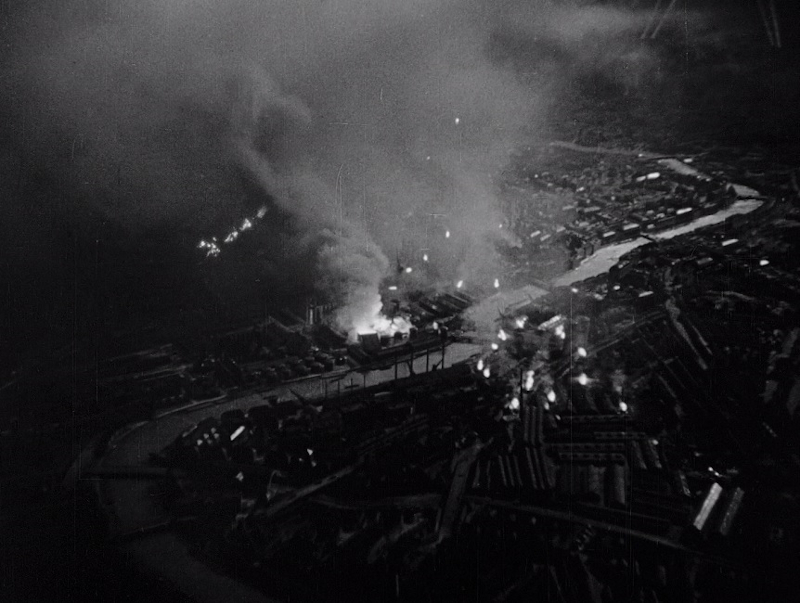
Bombs successfully dropped, and one engine taken out by flak, their makeshift plan to “stooge home on the other engine” falls apart when the second engine packs up, and they have to bail out over Holland, occupied by the enemy. By the time the six are on the ground, they are five, since no-one can find Bob. Spotted by two Dutch kids, the five find themselves in a farmhouse while the local women, led by the feisty Els Meertens (Pamela Brown), hold conference as to whether they are genuine Brit airmen or Nazi spies. Once satisfied that they are who they say they are, the Dutch devise a plan to take them across the country to the sea, from where they can escape in a small boat.
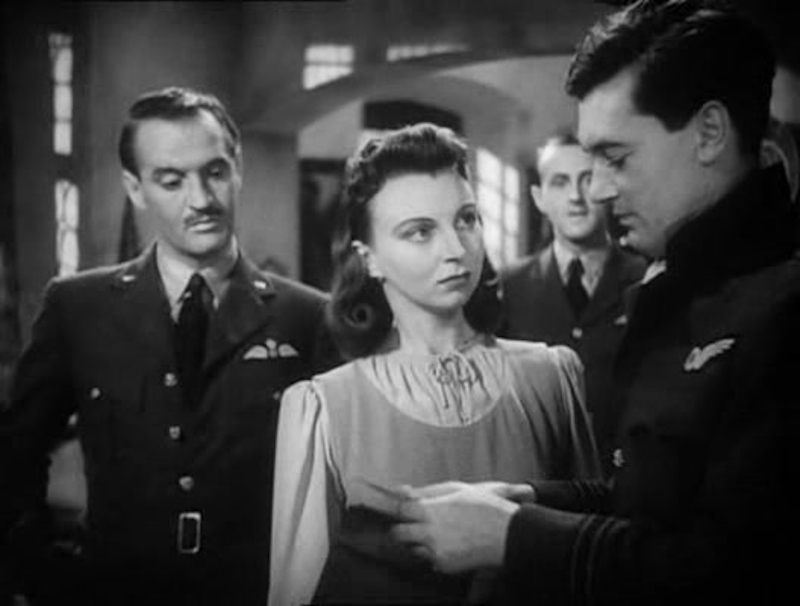
The remainder of the film arguably follows the template of The 49th Parallel (Director: Powell, Co-writer: Pressburger, 1941) in which a German U-boat crew stranded in Canada must make their way across enemy territory to the (then) neutral US to ensure their safety. Here though, there’s no conflicted loyalty, as the protagonists are on “our” side not theirs: the Archers’ attention is placed not only on the crew’s group dynamics, but also on how the bomber crew interact with the friendly locals trying to help them.
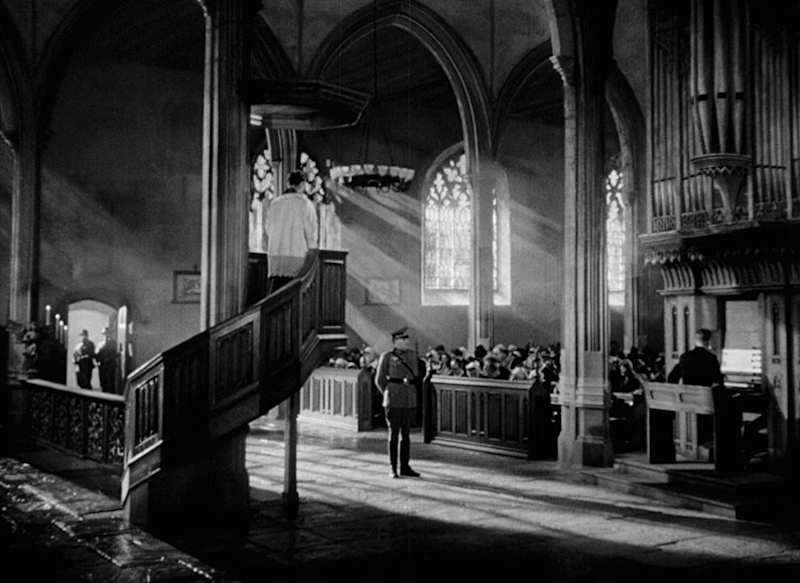
An atmospheric and suspenseful sequence in a Catholic church, with the minister (Peter Ustinov) preaching from the pulpit, in which Nazis enter a service to check out the congregation for enemy combatants, is followed by a run in at a town further along the way with a quizling De Jong (Robert Helpmann, later to appear in The Archers’ The Red Shoes, 1948, and The Tales Of Hoffmann, 1951). After that, they are hidden in a secret room in a labyrinthine coastal farmhouse run by the no-nonsense Jo de Vries (Googie Withers) before putting out to sea in a small boat, in which they must pass under a Nazi-patrolled swing bridge.
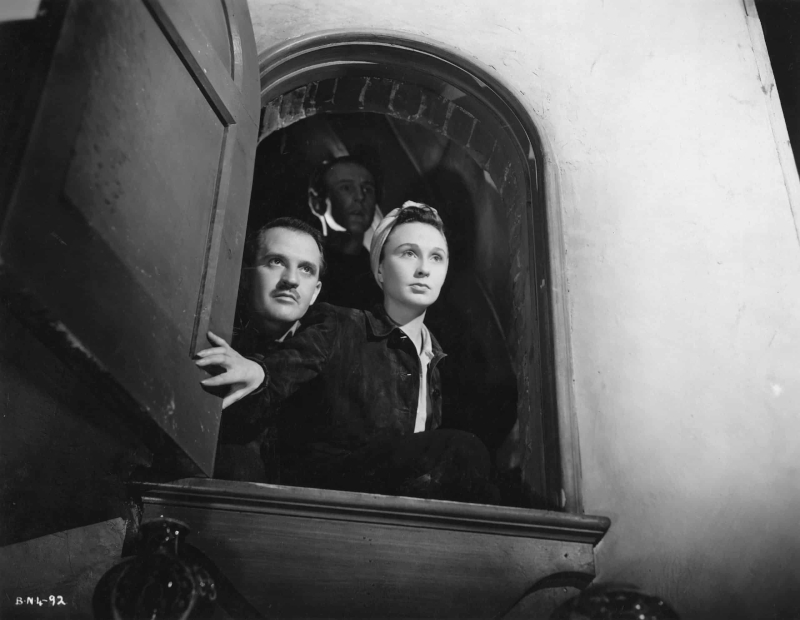
In terms of what it takes on, the black and white One Of Our Aircraft… may seem quite small scale compared to later, more ambitious Archers’ WW2 outings in colour such as The Life And Death Of Colonel Blimp (1943) or A Matter Of Life And Death, yet as a portrait of a crew making it home through occupied territory, it’s first-rate, with each of the six men clearly drawn by script, actors and direction. The Dutch characters too, particularly the two women, are also memorable (presenting an encouraging portrait of one of Britain’s allies against the Nazis to the audience back home).
If you had to pick a single Powell and Pressburger film, it probably wouldn’t be this one, yet it’s a fine example both of their early work and of British wartime propaganda cinema. I say propaganda, but the film is wrought with great finesse: you never feel like a viewpoint is being pushed down your throat.
One Of Our Aircraft Is Missing playsas part of major season Cinema Unbound: The Creative Worlds Of Powell + Pressburger from Monday, October 16th at BFI Southbank; also on BFI Blu-ray. Other films in the season can be found on BFI Player.
Clip:
Season Trailer:
